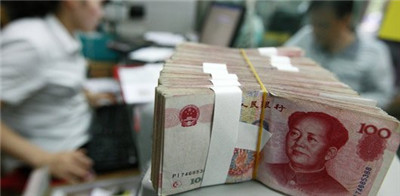(单词翻译:单击)
China’s central bank is considering extraordinary measures to boost credit flows to heavily indebted local governments, according to local media reports, as Beijing struggles to recapitalise the provinces after years of unsustainable borrowing and investment.
据中国媒体报道,中国央行正考虑采取非常措施提振流向负债累累的地方政府的信贷。经过多年不可持续的借款和投资后,北京方面正艰难地对地方政府进行资本重组。
The country’s local debt has surged since the 2008 financial crisis as regional governments borrowed to finance infrastructure projects in an effort to stimulate the economy. Experts have warned that the debt poses a risk to the banking system.
2008年全球金融危机爆发后,随着地方政府借款投入基建项目以求刺激经济,中国的地方债务出现飙升。专家警告称,这些债务现在对银行体系构成风险。

China’s economy is growing at its slowest pace in six years, according to official figures. Policy makers want to enable local governments to maintain infrastructure spending to cushion the impact from a slowdown in the property and manufacturing sectors.
官方数据显示,中国经济正以6年来最慢的速度增长。政策制定者希望让地方政府能够维持基础设施支出,以缓冲房地产和制造业放缓带来的冲击。
Some investors and media outlets have interpreted the bank’s plan to try to raise demand for cash-strapped local governments’ debt — by accepting it as collateral for loans to commercial lenders — as a form of quantitative easing.
中国央行计划允许商业银行以地方政府置换债换取央行资金,以此来加大市场对地方政府债务的需求。一些投资者和媒体对此举的解读是,这是量化宽松政策的一种形式。
But economists say it is better understood as a targeted measure to boost credit flows to local governments struggling to refinance Rmb1.9tn ($306bn) in debt due to mature this year.
但经济学家表示,更好的理解是,此举是一种有针对性的措施,目的是加大流向地方政府的信贷。资金拮据的地方政府正为今年将要到期的1.9万亿元人民币(合3060亿美元)债务艰难安排再融资。
“From the details we know it’s probably wrong to characterise this as quantitative easing. It’s tempting to think that China would join everybody else, but the reality is that the Chinese central bank seems to be concerned about banks’ reluctance to buy local government bonds,” said Frederic Neumann, chief Asia economist for HSBC.
“从细节看,我们知道将此举描述为量化宽松很可能是错误的。认为中国央行会加入其他主要央行行列的想法很诱人,但现实情况是,中国央行似乎担忧的是商业银行不愿购买地方政府债券,”汇丰(HSBC)首席亚洲经济学家范力民(Frederic Neumann)表示。
China’s finance ministry last month announced a plan for provincial governments to refinance Rmb1tn in maturing debt by selling bonds. The goal is to lower debt-servicing costs and extend maturities by converting short-term, high-interest bank loans to low-interest, long-term municipal bonds.
中国财政部上月宣布计划,拟让省级政府通过出售债券来为即将到期的1万亿元人民币债务安排再融资。其目标是降低偿债成本,并通过将短期、高息的银行贷款置换为低息、长期的市政债券来延长到期期限。
But this month at least two Chinese provinces had to postpone bond auctions due to insufficient demand from commercial banks. Allowing local bonds to be used as collateral would stoke demand for the paper.
但本月至少有两个中国省份不得不推迟债券拍卖,原因是商业银行的需求不足。允许地方债券被用作抵押品,将刺激对这些债券的需求。
Loans from China’s central bank to commercial banks would expand the People’s Bank of China’s balance sheet, increasing the base money supply.
中国央行向商业银行提供贷款,将扩大中国央行的资产负债表,从而增加基础货币供应。
But economists expect that increases in the money supply via the new PBoC lending facility would probably be offset by withdrawals via other tools such as reduced foreign exchange purchases, open market operations and the required reserve ratio.
但经济学家预计,中国央行新的放贷工具所增加的货币供应,很可能将被通过其他工具(如减少外汇购买、公开市场操作和存款准备金率)抽走的流动性所抵消。
“This isn’t really about adding liquidity. It’s aimed at alleviating debt pressures on local governments and reducing financial risks,” said Zhang Bin, director of the global macroeconomy research department at the Chinese Academy of Social Sciences, a think-tank that advises Beijing. The moves led to sharp falls in money market interest rates, which determine short-term borrowing costs for companies and banks.
“此举的意义不是真的要增加流动性。它的目的是减轻地方政府的债务压力,化解金融风险,”向中国政府提供咨询的智库——中国社会科学院(Chinese Academy of Social Sciences)的全球宏观经济研究室主任张斌表示。中国央行的政策已导致货币市场利率大幅下降,这些利率决定着企业和银行的短期借款成本。


